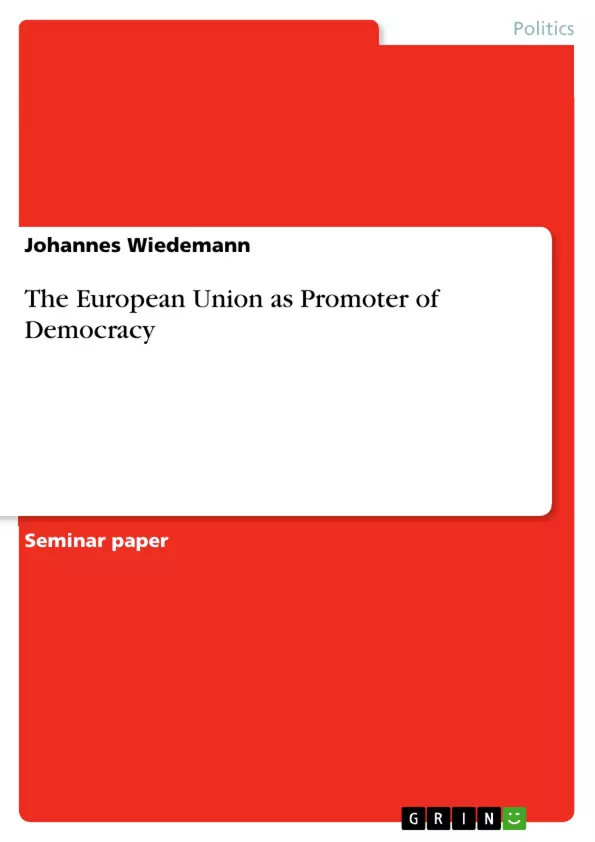In this paper the guiding questions were the following: What Is the EU concept of democracy? Can this supposedly universal norm be promoted by and with the EU external governance scheme? What means are in stock? What has been used? What is used? What are the
results? What can be, what has to be changed? A working definition of democracy is the scale of success which can be applied to the objectives and means in the European Union's ‘foreign policy’. The strategies are depicted as well as the level of ambition in democracy promotion of the European Union. The means to realize this ambition are be shown in comparison to the the successes or failures in application. The conflict of priorities in the European Union concerning external relations of the last thirty years is depicted against the backcloth of the normative set of standards drawn from the treaty.
Inhaltsverzeichnis (Table of Contents)
- Introduction
- 1. Core Value: Democracy
- a. The Rank of Democracy in the EU's legal foundations
- b. What is in the Name: Democracy
- i.Liberal / Libertarian Democracy
- ii.Communitarian Democracy
- iii.Deliberative Democracy
- c.European Democracy: A Working Title
- 2. Promotion of Democracy in EU External Action
- a. Objectives
- b.Strategies
- i. Democracy Assistance
- ii.Political Conditionality
- iii.Incentives Conditionality
- iv.Indirect Approach
- v.Socialisation Dynamics
- 3. Cases and Outcomes
- a.Tunisia
- b.Middle East
- c.Central Asia
- Conclusions
- References
Zielsetzung und Themenschwerpunkte (Objectives and Key Themes)
This paper explores the EU's approach to promoting democracy in its external relations. It investigates the EU's concept of democracy and examines the effectiveness of its various strategies for promoting democratic values and institutions globally. The paper analyzes specific cases of EU democracy promotion efforts and assesses their outcomes.- The EU's concept of democracy
- Strategies for promoting democracy in EU external action
- The effectiveness of these strategies
- Case studies of EU democracy promotion efforts
- The challenges and opportunities for EU democracy promotion
Zusammenfassung der Kapitel (Chapter Summaries)
- Introduction: This chapter introduces the guiding questions of the paper, focusing on the EU's concept of democracy and its promotion in external governance. It outlines the argumentative structure of the paper, which progresses from defining democracy to analyzing objectives, strategies, and case studies of EU democracy promotion efforts.
- 1. Core Value: Democracy: This chapter delves into the EU's foundational values, highlighting democracy's central role in the EU's legal framework. It analyzes relevant articles from the Treaty of Lisbon and examines the significance of democracy as a guiding principle for EU policies, both internally and externally. It further explores the concept of democracy, presenting three general approaches: liberal, communitarian, and deliberative.
- 2. Promotion of Democracy in EU External Action: This chapter examines the EU's objectives and strategies for promoting democracy in its external relations. It outlines various approaches, including democracy assistance, political conditionality, incentives conditionality, indirect approaches, and socialization dynamics. It provides an overview of the EU's toolbox for promoting democratic values and institutions abroad.
- 3. Cases and Outcomes: This chapter presents case studies of EU democracy promotion efforts in specific regions, including Tunisia, the Middle East, and Central Asia. It focuses on analyzing the successes and challenges encountered in these endeavors, providing insights into the real-world application of EU democracy promotion strategies.
Schlüsselwörter (Keywords)
The key concepts and themes explored in this paper include the EU's concept of democracy, democracy promotion, external relations, EU foreign policy, democracy assistance, political conditionality, incentives conditionality, case studies, and regional examples such as Tunisia, the Middle East, and Central Asia. The paper delves into the theoretical underpinnings of democracy and its operationalization within the framework of EU external governance.Frequently Asked Questions
What is the EU's concept of democracy in external action?
The EU promotes a model that combines liberal, communitarian, and deliberative democracy, considering it a universal norm and a core value of its legal foundations.
What is "Political Conditionality" in EU foreign policy?
It is a strategy where the EU links economic benefits or cooperation to the partner country's adherence to democratic standards and human rights.
Which regions are focused on in EU democracy promotion?
Key case studies include Tunisia, the Middle East, and Central Asia, where the EU uses various tools to foster democratic transitions.
What are "Incentives Conditionality" and "Socialisation Dynamics"?
Incentives conditionality offers rewards for democratic progress, while socialization dynamics involve long-term engagement to internalize democratic norms within foreign societies.
Is EU democracy promotion always successful?
Outcomes are mixed; successes in some regions are balanced by failures in others due to conflicting priorities, such as stability versus democratic reform.
- Citar trabajo
- Johannes Wiedemann (Autor), 2011, The European Union as Promoter of Democracy, Múnich, GRIN Verlag, https://www.grin.com/document/175483



